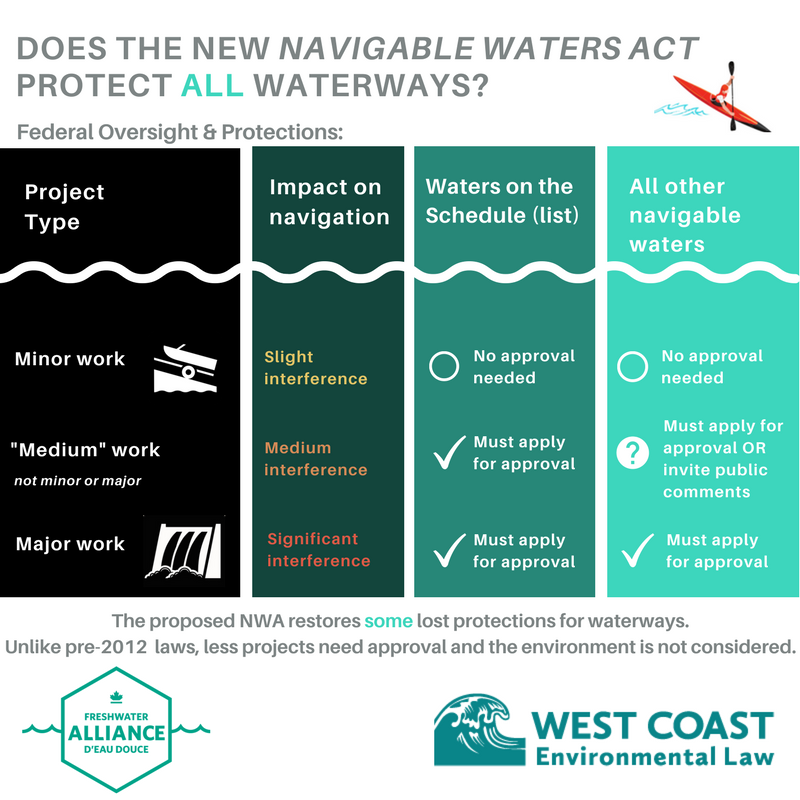Recently announced federal legislation must go further
OTTAWA - Environmental groups are calling on the Canadian government to fully restore legal protections for navigable waters. Bill C-69, which includes the newly proposed Canadian Navigable Waters Act, introduced in the House of Commons on February 8, broadens some protections for navigable waterways, but does not fully restore what was lost.
In 2012, the Navigable Waters Protection Act was replaced with the Navigation Protection Act, stripping federal protections from 99 percent of navigable waters. The changes introduced earlier this month are in response to mandates to restore those lost protections. The new Act extends protections beyond the exclusive list of waterways (called the Schedule) to include publicly accessible waterways. However, with waterways on private lands exempt and further regulations needed to set out the types of projects to which approvals are tied, it is unclear how broadly protections will be applied.
“We are encouraged by the requirement that major projects on waterways in Canada will have government oversight,” said Lindsay Telfer, national project director with the Canadian Freshwater Alliance, “However, that oversight is still very limited to what may be just a handful of projects and it does not include consideration of environmental or social impacts. In order to ensure that Canada’s lakes are rivers are protected, the Bill needs to go a lot further.”
“Advance notification and a public registry are a welcome improvement, but don’t go far enough,” said Andrew Gage, staff lawyer at West Coast Environmental Law Association. “Waterways in Canada need protecting from the cumulative impact of multiple projects, and it shouldn’t be up to the public to prevent harmful projects from going ahead. To live up to its campaign promise, the government needs to go all the way towards restoring the protections our waters had for over 100 years.”
"Reforms in 2012 helped advance the development of pipelines, and thanks to a Greenpeace FOI request, it's known that those changes mirrored a 2011 letter drafted by the energy industry," said Emma Lui, water campaigner with the Council of Canadians. "We also support Indigenous nations’ calls for free, prior and informed consent. Any modern safeguards must incorporate the UN Declaration on the Rights of Indigenous Peoples."
“While increased transparency in decision making is a much-needed step toward restoring public trust, the minister still has discretion over whether a project will trigger an environmental assessment – even for proposed development on waters already on the Schedule. There should be a clearly stated scientific threshold to determine which projects require assessment, so decisions are based on science, not politics,” said Elizabeth Hendriks, vice-president of freshwater conservation at World Wildlife Fund Canada. “We look forward to working with the government to ensure policies and regulations in the act define environmental triggers and account for cumulative effects.”
Environmental groups across Canada have vowed to keep tracking the new legislation as it gets debated, and amended, in the House of Commons. “Greater protections will be needed if public trust is going to be fully restored,” said Lindsay Telfer.
-30-
Media Contacts:
Canadian Freshwater Alliance
Natalija Fisher, NPA organizer - 416-854-8515; natalija@freshwateralliance.ca
Council of Canadians
Emma Lui, water campaigner - 613-617-6799; elui@canadians.org
West Coast Environmental Law Association
Andrew Gage, staff lawyer - 604-601-2506; agage@wcel.org
World Wildlife Fund Canada
Rebecca Spring, senior communications specialist, 416-338-6274; rspring@wwfcanada.org
About us:
The Freshwater Alliance, a project on the Tides Canada shared platform, is a national initiative that builds, connects and supports freshwater constituencies across Canada. We work with environmental organizations, community groups, government and businesses to strengthen citizen engagement and participation in the protection of our lakes and rivers.
Founded in 1985, the Council of Canadians is Canada’s leading social action organization, mobilizing a network of 50 chapters across the country. Through our campaigns we advocate for clean water, fair trade, green energy, public health care, and a vibrant democracy. We educate and empower people to hold our governments and corporations accountable. The Council of Canadians is a registered non-profit organization.
West Coast Environmental Law Association harnesses the power of law to solve complex environmental challenges. We are transforming environmental decision-making and strengthening legal protection for the environment through collaborative legal strategies that bridge Indigenous and Canadian law. By putting the law in the hands of communities and creating legal risk for those who would harm our land, air and water, we are building the collective power to achieve a more just and sustainable future for all.
World Wildlife Fund Canada creates solutions to the environmental challenges that matter most for Canadians. We work in places that are unique and ecologically important, so that nature, wildlife and people thrive together. Because we are all wildlife. For more information, visit wwf.ca
